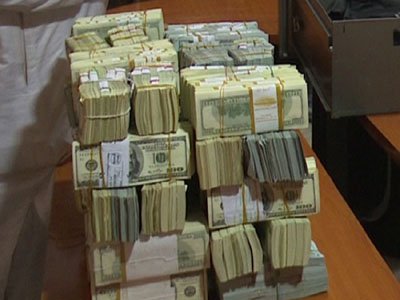
The Central Bank of Nigeria (CBN) believes the naira is under speculative attack. So, it wants to run these speculators out of town. Unfortunately, this could be an uphill task for the apex bank. More people are now speculating on the naira.
Interestingly, the inability of commercial banks to provide enough naira to buy up over $600 million injected by the CBN seems to reinforce the apex bank’s position.
“As proof that, when we supplied $500 million to the market, only $371 million was taken up. That tells you that it was all a bubble. The real demand was $371 million,’’ the CBN’s director of communication, Isaac Okorafor, argued.
Actually, before the CBN’s intervention, most analysts had predicted that the naira would have to be devalued. And many traders had exchanged their naira holdings with the greenback. Many, also, invested in government securities, which have very high returns. So, when the CBN’s dollars came in, there was insufficient naira in the market.
With the recent disbursement of January’s FAAC allocations to ministries, agencies, states and local governments, the attack on the naira resumed. Last Friday, the naira depreciated to N465/$ from about N450/$ in the black market.
This is just a sign of things to come. There would be surplus naira to be used in attacking dollars when the government passes the 2017 budget and its implementation commences. The naira could be heading to N600 when this happens.
Seeing these renewed speculative attacks, and in a bid to checkmate speculators, some CBN sources announced, last Friday, that the apex bank was planning to inject another $350 million in the coming weeks. But the apex bank does not have infinite reserves.
These attacks are worrisome. Economists know that currency speculation destabilises economic policies. And with speculation, the cheap naira that was sold a fortnight ago would have little or no effect on the prices of goods and services. After all, it hasn’t reflected in prices. (Apparently, The Economist was right in arguing that this cheap naira actually was more beneficial to posh Nigerians who used it to pay school fees, medical bills and other expenses abroad.)
And there are other issues. This May, OPEC countries would have to re-evaluate the benefits of its cut in production, which had made oil prices go north. And since current data show that the recent rise in oil prices has given oxygen to the shale producers in the US, the cartel might be forced to recalibrate its decision. And if this happens, and oil moves south, there would be little inflow of dollars for the CBN to use in defending the naira.
Traders know this. Little wonder, six months forward contracts – which is the amount traders are ready to buy dollar that would be used in a future date – is quoted at N382. This is way above the current “official” price.
It is clear that the nation’s monetary policies are no longer alleviating the sufferings of most Nigerians. It is not bringing in foreign investments, as well. Instead, it is enriching speculators.
Sadly, it is extremely difficult to deal with speculators in economies where the government is rewriting basic economics with its own theories. A case in point is how George Soros made billions, in the early 90s, from the pounds when the UK was working against the fundamental principles of economics.
Nigeria needs to rework its monetary and fiscal policies. Big ideas and unconventional solutions are urgently needed. We need to go back to the fundamentals. A situation where a country goes to borrow $1 billion and promises to pay its lenders about $2.2 billion in 2032 and the next day uses over $600 million from its reserves to defend its currency doesn’t make sense to many. Especially when the relative appreciation in the currency might soon be eroded.


This is a well-thought article. I agree with most views expressed. It is time we go back to basis.The government should pump resources into agriculture , sciences and technology sectors of the economy.